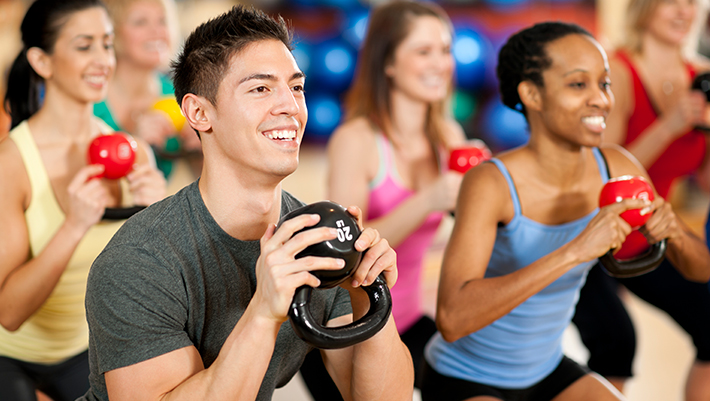
Boost your well-being with just a few simple tweaks to your workout moves.
Looking for a workout that improves co-ordination, boosts balance, increases muscle strength, raises your endurance, and makes everyday tasks easier? Look no further than functional fitness. We know what you might be thinking: Functional fitness sounds technical and, frankly, like the opposite of fun, but don’t be fooled by the name. Functional fitness is simply well-tailored strength training that involves multiple muscle groups and enhances your ability to get things done, like hauling a heavy backpack across campus, lifting your kids in and out of their car seats, or weeding the garden.
“It’s like training for life,” says Nick Clayton, M.S., personal training program manager for the National Strength and Conditioning Association, in Colorado Springs, Colorado. You’re teaching your muscles to work together. Doing 50 sit-ups? Great for your waistline, but they won’t really make it easier to rearrange the living room furniture. Doing a squat while raising a kettlebell, on the other hand, trains the muscles you use to bend down, pick up and move the couch.
Spend more time on functional fitness, he says, and you’ll appreciate some pretty impressive perks: better balance, a stronger core, improved flexibility, and fewer nagging aches and pains.
Ready to master functional fitness? Here’s how to get started.
Consider your daily routines. Think about everything you need to tackle in a day. Are you getting in and out of a car frequently? Does your job involve a lot of lifting or reaching? Or are you focused on smaller, repetitive motions? Knowing how you need to use your body will help you find the best functional exercises for you.
Talk to a pro. You don’t need a personal coach or a pricey series of one-on-one sessions, but it is a good idea to track down a certified personal trainer. “Because functional fitness exercises involve moving more than one muscle or joint, there’s more coordination involved, and good form is important,” says Clayton. “Get instruction so you make sure you’re doing it right and don’t injure yourself.” Most gyms and community fitness centres have trained staff on site who can help you map out a few basic moves to suit your goals. Or follow Clayton’s starter plan in the three-week Mindful Functional Fitness Challenge.
Line up some basic equipment. Remember, functional fitness is tailored strength training. While your own body weight is enough for most functional exercises, you might want to pick up a few hand weights, kettlebells, fitness balls, resistance bands, and wobble boards to challenge yourself.
Learn how to decode a gym’s fitness class menu. Even though the American College of Sports Medicine has declared functional fitness a top 10 fitness trend for 2018, you’ll be hard pressed to find those words in the title of any group fitness class. (Functional Fitness Yoga doesn’t exactly scream “woo-hoo!”). Look for classes described as building muscle fitness (strength, muscular endurance, and power), flexibility, or balance, or that talk about delivering a head-to-toe workout. Tai chi, yoga, and barre classes are all great examples. Generally speaking, spinning classes, classes that target specific body parts, and classes that involve high-energy dance choreography don’t count. (That doesn’t mean stop taking those classes if you enjoy them!) When in doubt, ask the instructor.
Give it a try. You can try out functional fitness exercises right now. For someone carrying a heavy backpack or lifting a toddler out of a car seat, for example, a bent over row will strengthen all of the muscles involved in those movements. To do: Holding a weight in one hand, lean over a bench or chair with arm at your side. Pull the weight up, pointing elbow to the ceiling and keeping upper arm parallel to the ground.
 Mindful Sodexo
Mindful Sodexo 
0 Comments